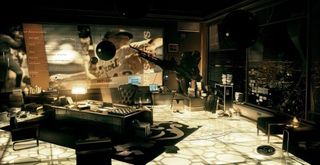Interview: the art of Deus Ex: Human Revolution
PCG: Deus Ex 2 seemed to have more of an artistic direction than Deus Ex 1. It's a very clear vision of the future, but people seemed to react really badly to it. How do you feel about that?
Jacques-Belletete: Yeah, this has definitely worried me more than "how much are we following the first one?", because yeah, we are taking some liberties and some aesthetic choices.
[long pause]
I mean, there's no purple!
PCG: [laughs]
Jacques-Belletete: You know, with technology, we read so many books - all the Ray Kurzweil books, and all the technological curve books - about where things are going. You just look at display technology. Today is already where way more advanced than most of the things we see in Deus Ex 1.
There's that, the technology is more advanced, but it already is more advanced in a lot of parts than in Deus Ex 1. You just look at web 2.0 and that kind of stuff and it's way beyond what you say in Deus Ex 1. The game came out in 2000 so they were probably designing it in 1998, 99, so there's that.
The biggest gaming news, reviews and hardware deals
Keep up to date with the most important stories and the best deals, as picked by the PC Gamer team.
That doesn't worry me all that much, I mean hey, what the hell? Obviously we're doing everything to please the fans, but we need to get a lot of people other than the fans, it's just the nature of the games industry. This game needs to make money, right? I'm not going to make screens that are 4:3 ratio just because that's what they had in the first one. It makes no sense, we're already way beyond that today, so I need to follow suit.
Now, as far as the Cyber Renaissance, well, it's somewhat of a reboot of the franchise. Notice that the number 3 is not in the title. A lot of people have no idea what Deus Ex is. The fans think that the whole universe knows what that game is, but it's just not true.
PCG: Yeah.
Jacques-Belletete: And trust me, I was one of those people. The first focus test was a big eye opener, so hopefully the aesthetic choices that we made is also to try to have a very tangible flavour that'll attract a lot of people also.

PCG: What games have you worked on before?
Jacques-Belletete: I started in 99 as a concept artist at a startup that was called Diad. It was like a PC startup, we did little PC strategy games, stuff like that. Then I did a whole bunch of Warner Bros and Disney stuff and everything, like Monster's Inc, and things like that, the licensed games. Then I worked on - have you heard the game Wet?
PCG: Yep.
Jacques-Belletete: Before it became Wet, because it went through quite a few cycles, and I worked on quite a few of those. Then Ubisoft called me with an art director position on Assassin's Creed, but the PS2 version at the time. Which is quite interesting, because most people don't know that there was a PS2 version. The great thing about it is that there was no way you could port the 360 version on a PS2, so it was really a game on its own. It had it's own art direction, it happened in a totally different area with a different story, different characters and everything. That was before the next-gen consoles came out. They had the devkits and everything, but when they realised how strong the license would be, they said, you know, we'll focus on just one communication, and they cancelled the current gen version. Which was quite a bummer because I think we had something really... It would have been one of that last stroke of PS2 and Xbox games, it would have been a really good one I think.
Then after that we did a whole bunch of spin off pitches for Prince of Persia and everything, which ended up being shelved, and I did Far Cry after that.
PCG: Far Cry 2?
Jacques-Belletete: No, the first Far Cry, and the Predator Far Cry. That was at a time where, four or five years ago, Ubisoft were a little like, “Man, is our licenses getting a little stale? Do we need something new?” So me and Jeff, the creative director on Far Cry, had about two years to come up with a whole bunch of new IPs, like a whole bunch of new ideas.
PCG: Man, I bet that was-
That was a great year and a half, we had everything we wanted. Came up with some good stuff... and then Avatar was starting, and the new Rainbow Six: Vegas. They needed an art director on Avatar and a creative director on Vegas, and they were a little short on people, so they took us out of our incubations and they put Jeff on Vegas and I was art director on Avatar.
Then these guys called us for Deus Ex. We really had no reason to leave Ubisoft. Everything was great, I was like this close to finally meeting James Cameron, one of my heroes. I think two weeks after I left they flew down to LA to go and meet him. Jeff was on a great game also, but it was really Deus Ex. We're huge fans of Deus Ex. This is it, there's no better game to design, so here we are.
Most Popular


